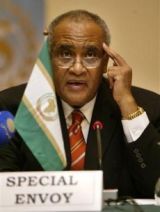Darfur peace talks resume, rebels in show of unity
Nov 29, 2005 (ABUJA) — Two Darfur rebel movements spoke with one voice at the launch of a seventh round of peace talks with the Sudanese government on Tuesday, acting on a pledge to halt infighting that has hampered progress.

“Both movements have reached agreement on a common document in order to achieve as much benefit and success as possible for the people of Darfur,” said Ahmed Tugod, chief negotiator of JEM, on behalf of both rebel groups.
In the previous rounds, each movement spoke separately at the launch ceremonies.
The rebels, the government and the mediators all expressed hope that this seventh round of talks would be decisive and that the rebels’ recent efforts to unify their positions would ease the negotiations.
Tugod’s speech on Tuesday was less confrontational towards the government than in earlier rounds, when rebel representatives aired long lists of accusations against Khartoum.
Abdel Wahed Mohamed el-Nur and Minni Arcua Minnawi, who both claim to be chairman of the SLA, both attended the launch ceremony but did not give speeches. The two men agreed last week to paper over their differences for the peace talks.
BREAKTHROUGH
Chief mediator Salim Ahmed Salim of the African Union called the rival leaders’ agreement “a breakthrough”, while Khartoum’s chief negotiator, Majzoub al-Khalifa, said it represented “remarkable progress”.
In New York, U.N. Secretary-General Kofi Annan welcomed the resumption of the Abuja talks and appealed to all parties to stop all violence on the ground immediately and negotiate “a just and comprehensive peace agreement”, a spokesman said.
The SLA and the JEM took up arms in early 2003 in Darfur, a desert region the size of France, over what they saw as discrimination and neglect by Khartoum, which responded by arming local militias to fight the rebels.
The ensuing campaign of killings, attacks on villages and rapes left tens of thousands of people dead and drove more than 2 million from their homes into refugee camps in Darfur and neighbouring Chad.
Previous rounds of talks yielded a joint declaration on broad principles of power sharing, wealth sharing and security but left the nitty-gritty of a comprehensive deal for later.
Nur told Reuters the two rebel groups now had a common position on all three areas.
Another novelty that could speed up the talks is the inclusion in Khartoum’s delegation of members of the Sudan People’s Liberation Movement (SPLM), a former rebel movement from southern Sudan that is now part of the government.
The SPLM fought Khartoum for more than two decades before reaching a peace agreement in January.
“The causes of the Darfur movements are similar to what the SPLM fought for. We understand their grievances and our experience shows those grievances can be addressed,” Yassir Arman, one of the negotiators from the SPLM, told Reuters.
Many observers had expressed pessimism in the run-up to the seventh round, citing rebel infighting, doubts over how serious the government would be about implementing any agreement, and an increase in violence on the ground over the past two months.
Earlier on Tuesday, a breakaway rebel faction in Darfur said it had killed 37 soldiers and police in an attack aimed at pushing for its inclusion in the talks. There was no independent confirmation of the toll.
(Reuters)
